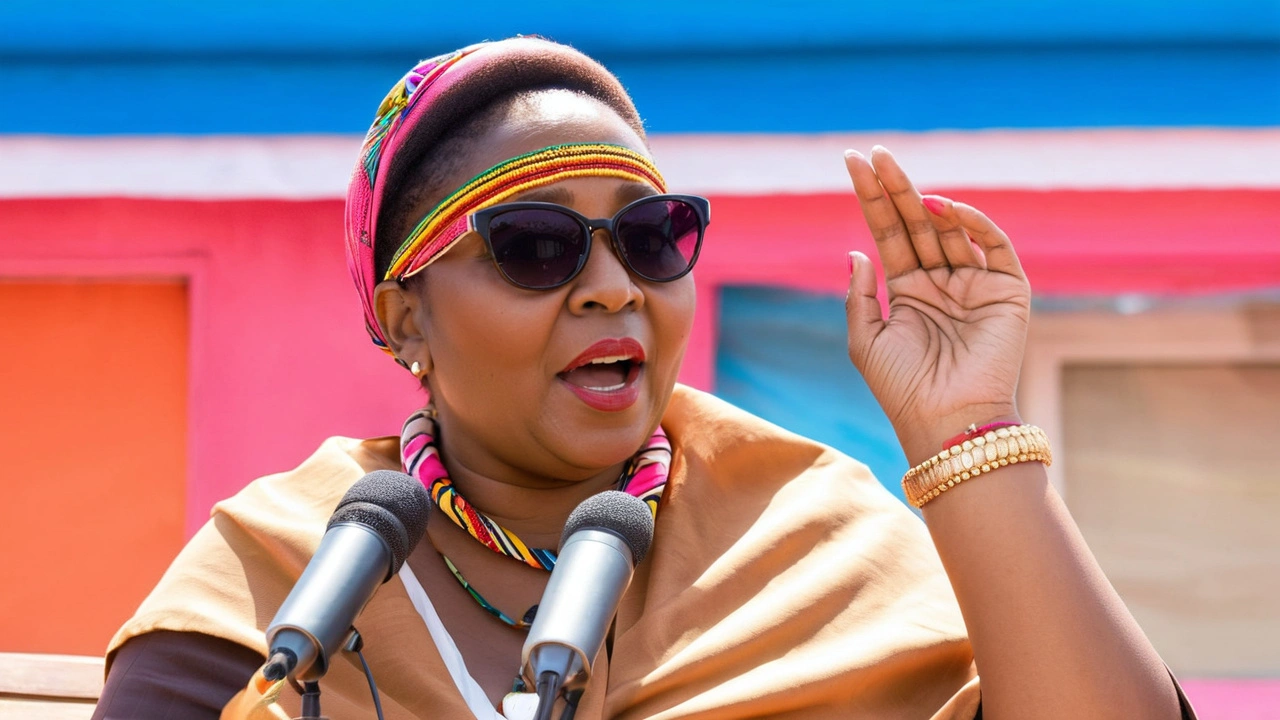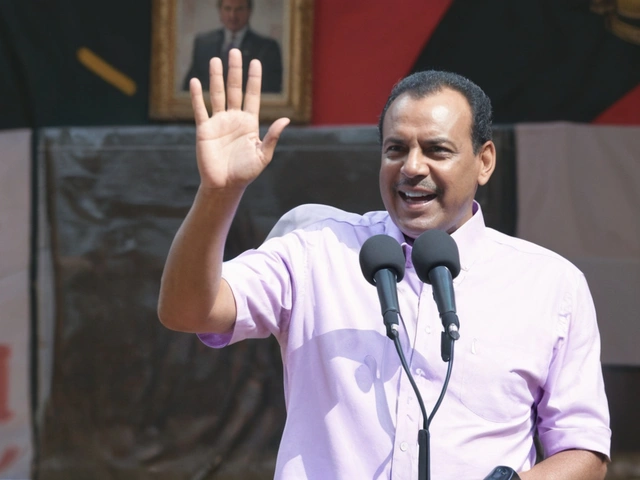Aisha Jumwa Backs Hassan Joho for Cabinet Secretary Post
Aisha Jumwa, who served as the Cabinet Secretary for Gender and Culture until last week, has made headlines by publicly endorsing Hassan Joho for a Cabinet Secretary role in President William Ruto's government. Jumwa’s support for the former Mombasa governor comes shortly after her dismissal from her ministerial position. She has stated openly that her fate is closely tied to his, a sentiment that resonates with many in the Kenyan coastal region.
A Significant Political Endorsement
The endorsement from Jumwa is more than just a simple show of support. It has ignited a wave of political activity, particularly among coastal politicians and religious leaders who are rallying behind Joho. They believe he has the necessary skills and experience to take on a crucial role in the Cabinet. Joho, who served as the governor of Mombasa, has been a prominent figure in Kenyan politics, known for his strategic acumen and leadership skills. His supporters argue that his appointment would not only benefit the coastal region but also bring a wealth of experience to the national government.
Aisha Jumwa's Political Journey
Jumwa’s own political journey is notable. She has been a vocal and influential leader, advocating for gender equality and cultural issues. Her recent dismissal from the post has not deterred her spirit or her political activities. Instead, it seems to have galvanized her efforts to support other influential figures like Joho. Through this endorsement, she signals a strategic alignment that could potentially shape the future political landscape of Kenya’s coastal region. Her backing of Joho suggests that she’s putting considerable faith in his ability to secure a ministerial position and, by extension, ensure continued representation for coastal interests at the national level.
Joho’s Political Credibility
Hassan Joho’s political career has been marked by notable achievements and significant public support. As governor, he played a key role in modernizing Mombasa, attracting investments, and improving infrastructure. His leadership style has often been described as charismatic and people-oriented. These attributes have earned him a loyal following, not just within Mombasa, but across the coastal region. Coastal politicians and religious leaders are now advocating for his inclusion in the Cabinet, arguing that his track record speaks for itself, and he is well-suited to take on a larger role in shaping national policies.
Regional Dynamics and Political Implications
The coordinated efforts by coastal politicians and community leaders to support Joho’s Cabinet bid reflect broader regional dynamics and political alliances. The coastal region, with its unique socio-economic challenges and opportunities, often requires representation that understands its intricacies. By pushing for Joho’s appointment, his supporters aim to ensure that these specific needs are addressed at the national level. This move could also signify the region's strategic realignment within the broader Kenyan political framework, potentially influencing upcoming electoral strategies and power balances.
Religious Leaders' Involvement
Religious leaders’ involvement in backing Joho is significant. Religious institutions hold substantial sway in coastal communities, and their support can mobilize voters and shape public opinion. By endorsing Joho, these leaders are signaling their approval of his political aspirations and capabilities. This endorsement from a diverse array of community leaders adds a moral and ethical dimension to the political push, highlighting Joho's reputation and his perceived integrity. It’s a move designed to garner widespread community support and put pressure on national decision-makers to consider his candidacy seriously.
The Broader Political Landscape
This endorsement also comes at a critical time for President Ruto’s government. As it seeks to consolidate power and ensure stable governance, the inclusion of experienced and widely-supported leaders like Joho could be beneficial. Joho’s potential appointment might serve to bridge regional divides, bringing a more inclusive and representative approach to the Cabinet. For Ruto, this could mean strengthened support from the coastal region, which is vital for maintaining national unity and addressing regional disparities.
Future Implications and Strategic Considerations
Jumwa’s endorsement of Joho is a strategic move with multiple implications. For Jumwa, aligning with Joho could mean sustained political relevance and influence, particularly if Joho secures a Cabinet position. For Joho, this backing is a boost to his credibility and appeal, potentially swaying undecided stakeholders in his favor. For coastal politics, it represents a unified approach to national representation, aiming to secure beneficial outcomes for the region. For President Ruto’s administration, it could signify an opportunity to bolster its ranks with experienced leaders committed to national and regional development.
Conclusion: A Watershed Moment in Coastal Politics
The endorsement of Hassan Joho by former Gender Minister Aisha Jumwa is more than a political gesture; it’s a strategic alignment that holds significant implications for Kenya’s coastal politics. With the support of influential coastal leaders and religious figureheads, Joho’s potential inclusion in the Cabinet could steer regional and national policies toward more inclusive and effective governance. As the political landscape continues to evolve, such endorsements and alliances will be pivotal in shaping Kenya’s future direction.




Comments
Jumma’s shout‑out to Joho is like a splash of colour on a rainy day!
Honestly, this whole endorsement reeks of opportunistic bandwagon‑jumping; Jumwa is just swapping one patron for another while the coast watches the same old power‑play.
Strategic alignment signals systemic hybridity; the endorsement functions as a vector for regional policy integration.
Well, if you love the drama, enjoy the show 😊
Let's keep the vibes high and hope Joho brings some real change
From a cultural standpoint, Jumwa’s backing of Joho is emblematic of a broader narrative where coastal identities seek representation at the highest echelons of governance. It underscores the historical marginalisation that has long plagued the region, prompting local leaders to coalesce around familiar faces. Joho, having steered Mombasa’s development, carries a portfolio that resonates with infrastructural aspirations. Moreover, his charisma has cultivated a network of stakeholders eager to see their interests reflected nationally. Jumwa, despite her recent dismissal, remains a potent symbol of gender advocacy, and her endorsement signals solidarity rather than subservience. This alliance could potentially recalibrate the balance of power, nudging President Ruto toward more inclusive cabinet appointments. Critics argue that such patronage merely perpetuates clientelism, yet the genuine desire for regional development cannot be dismissed outright. The coastal clergy’s involvement adds a moral veneer, suggesting that the endorsement transcends mere political calculation. In practical terms, a Joho appointment could catalyse investment pipelines, especially in tourism and maritime commerce. The ripple effect might also inspire peripheral counties to demand proportional representation. Yet, one must consider the risk of entrenching regional elites who may prioritize personal gain over collective welfare. Historical precedents warn of fragmented governance when local interests dominate national policy. Nevertheless, the current momentum suggests a collective yearning for tangible progress. If Joho secures the post, his track record will be scrutinised under the national spotlight, testing his administrative acumen beyond municipal confines. Ultimately, this endorsement is a litmus test for Kenya’s ability to harmonise diverse regional voices within a unified developmental agenda.
It is rather fascinating how the political chessboard aligns itself when seasoned statesmen such as Joho are spotlighted, reflecting a consummate mastery of statecraft that many lesser actors simply lack.
One might wonder about the long‑term implications of coastal bloc voting patterns and whether they could reshape the national policy framework in subtle yet profound ways.
yeah its a big deal but also kinda expected its just politics
Don't be fooled – this is another covert operation by the elite to place their own puppet in the cabinet, ensuring the silencing of dissent and the continuation of a hidden agenda.
While skepticism is healthy, it's also important to recognize that collaborative leadership can bridge gaps, fostering inclusive dialogue that benefits all constituencies.
Optimism is key; let's hope this partnership sparks genuine progress for the coastal communities.
Indeed, the prospect of a synergistic partnership beckons a renaissance of sorts for the coastal narrative, where historical grievances may finally find resolution through constructive policy dialogues. By weaving together Jumwa’s advocacy for gender equity with Joho’s infrastructural vision, a holistic framework emerges-one that could address socioeconomic disparities while honoring cultural heritage. Such a confluence demands not only political will but also communal participation, ensuring that grassroots voices echo within the corridors of power. The presence of religious leaders further amplifies moral stewardship, potentially guiding decisions toward equitable outcomes. Moreover, this alignment may serve as a template for other regions yearning for balanced representation, thereby strengthening national cohesion. While challenges undoubtedly loom, collective resolve can transform adversities into opportunities for sustainable development. In essence, this moment encapsulates a pivotal juncture where strategic alliances transcend mere symbolism, evolving into tangible catalysts for transformative change.
Frankly, this endorsement feels like a desperate grab for relevance; the coastal drama is getting stale and overshadows real governance issues.
While I see your point I think it's important to acknowledge that political support can sometimes be a pragmatic step toward broader regional development
Its good to see folks stepping up for their area but lets keep the convo focused on what actually matters for the coast
Totally agree! It’s great when local leaders push for real change 🙌
Supportive stance noted though the tone could be more measured in discussing policy nuances
Happy to help clarify any details – just let me know if you need more info! 😊